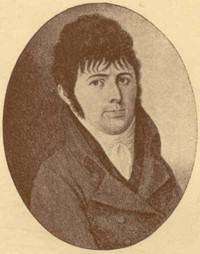Jan Theobald Held
| Jan Theobald Held | |
|---|---|
 | |
| Born |
December 11, 1770 Třebechovice pod Orebem |
| Died |
June 20, 1851 (aged 80) Prague |
| Other names | Johann Theobald Held; Jan František Held; Jan Orebský |
| Occupation | physician, composer |
Jan Theobald Held (December 11, 1770 – June 20, 1851), also known as Johann Theobald Held was a Czech physician, educator, musician, and composer.
Early life and education
Jan was born in Třebechovice pod Orebem on December 11, 1770.[1] His early education took place in the town of his birth, where he received training in singing and in instrumental performance.[1] His father died in 1780, and he was sponsored by townspeople to join a choir in Prague, and also to attend secondary school, where his academic aptitude earned him a scholarship that allowed him to complete his education.[1] In the choir he had been a boy soprano, but at age 19 his voice no longer allowed this, so he turned his attention to violin and viola performance.[1] His teachers encouraged him to devote himself to the study of medical science,[1] and he received his M.D. degree in Prague in 1797. [2] Before his father died, he instructed Jan to pursue his fortune in a foreign country. Therefore Held intended to follow his older brother to Poland, but circumstances ultimately discouraged him from doing so.[1]
Medical career
He then practiced medicine at the Brothers of Charity hospital in 1799[2] at the invitation of his friend Dr. Daniel O'Hehir[1] At O'Hehir's untimely death (age 27) in 1799[1] Held was chosen as his successor.[3] In 1813 he became head of the mental asylum there, and in that capacity was instrumental in modifying patient treatment resulting in more humane care and conditions.[2] He devoted the greater part of his salary in improving the lives of individual patients and in maintaining the hospital.[1] He became head physician in 1822.[2] The next year he became the chief examiner for medical exams in Prague.[1] He served at Brothers of Charity until 1824.[2]
Held came to the conclusion that various psychosis were of materialistic origin, and came to the conclusion that thinking itself was a chemical process. He was an early proponent that mental health is affected by environmental conditions. For instance, in 1811 he made the correlation between state bankruptcy and the resulting decline in societal condition, and an increase in psychological issues. He disproved a popular theory that mental disorders were increased by the appearance of a comet.[4]
Later career
Five times he was elected dean of Charles University in Prague.[2] He became an imperial counselor in 1841.[2] In 1847 the physicians of Prague recognized his 50 years of service as a physician.[1] He died in Prague on June 20, 1851.[1]
Writings
Because he devoted so much time to patient care and the administration of the hospital, Held's publications are fewer than might be expected of someone holding his educational position.[1] His publications include:[1]
- Das Heimatsfest zu Hohenbruck, in Böhmen am 16.–18. Juli 1816, Prague 1818
- Ein Wort bei der Immatriculation der an der Prager Carl-Ferdinands-Universität sich den sämmtlichen Studien der Heilkunde widmenden Zöglinge, Vienna 1820
- Kurze Geschichte der Heilanstalt der Barmherzigen Brüder in Prag. Nebst Rückblicken auf Entstehung, Verbreitung und Schicksale dieses Ordens überhaupt, Prague 1823 (Digitized)
- Tentamen historicum illustrandis rebus anno MCCCCIX in Universitate pragena gestis, Prague 1827
- Blick auf Carlsbad. Ein Sendschreiben an den Herrn Johann Ritter de Carro, Prague 1835 (Digitized)
- Ein Wort an die Zöglinge der vom Vereine für Kirchenmusik begründeten Orgelschule, Prague 1837
- Zweiter Blick auf Carlsbad. Ein Sendschreiben u. s. w., Prague 1838
Musical contributions
In addition to the violin, he was an accomplished player of the guitar.[1] He published a set of folk songs under the pseudonym Jan Orebský.[1]
Posthumous
Held's reputation and fame among Czech people was solidified by a romanticized depiction in the novel F. L. Věk by Alois Jirásek.[5]
References
- 1 2 3 4 5 6 7 8 9 10 11 12 13 14 15 16 von Wurzbach, Constantin (1862). Biographisches Lexikon des Kaiserthums Oesterreich. 8. Vienna: Kaiserlich-königliche Hof- und Staatsdruckerei. pp. 243–246.
- 1 2 3 4 5 6 7 Wallace, Edwin R.; Gach, John, eds. (2010). History of Psychiatry and Medical Psychology: With an Epilogue on Psychiatry and the Mind-Body Relation. Springer Science & Business Media. p. 297. ISBN 9780387347080.
- ↑ "Held Johann Theobald". In: Österreichisches Biographisches Lexikon 1815–1950 (ÖBL). Vol. 2, Austrian Academy of Sciences, Vienna 1959, p. 255.
- ↑ Kiev, Ari (1968). Psychiatry in the Communist World. Science House. p. 123. LCCN 67-27405.
- ↑ "Jan Theobald Held". Historical Abstracts: Modern history abstracts, 1775–1914. American Bibliographical Center. 20: 124. 1974.